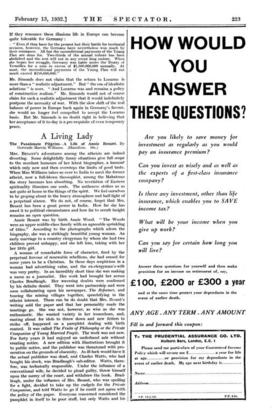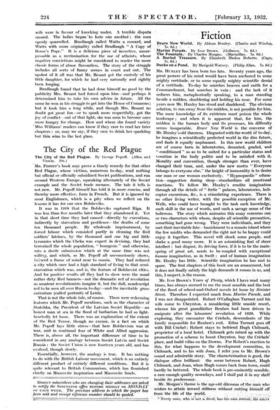A Living Lady
The Passionate Pilgrim—A Life of Annie Besant. By Gertrude Marvin Williams. (Hamilton. 18s.) Mat. BESANT'S adventures among the atheists are indeed diverting. Some delightfully funny situations give full scope to the mordant humours of her latest biographer, a humour which only now and then oversteps the limits of good taste. When Miss Williams takes us over to India to meet the former atheist, now a full-blown theosophist, among the Mahatmas the story becomes less absorbing. No revelation of Eastern spirituality illumines our souls. The authoress strikes us as not quite at home in the things of the spirit. We feel ourselves to be groping about in the heavy atmosphere and half-light of a perpetual seance. We do not, of course, forget that Mrs. Besant has been a great power in India. How far she has owed it to political circumstance and how far to occult insight remains an open question.
Annie Besant was by birth Annie Wood. " The Woods were an upper middle-class family with an agreeable sprinkling of titles." According to the photographs which adorn the biography, she was a strikingly beautiful young woman. An early marriage to a country clergyman by whom she had two children proved unhappy, and site left hint, taking with her her little girl.
A woman of remarkable force of character, fired by the perpetual fervour of renewable rebellions, she had ceased for some years to be a Christian. In those days scepticism in a woman had advertising value, and the ex-clergyman's-wife was very pretty. In an incredibly short time she was making a name as a journalist. Her work had brought her across Charles Bradlaugh. Her wavering doubts were confirmed by his definite denial. They went into partnership and were soon collaborating upon his newspaper, The Reformer, and touring the mining villages together, speechifying in the atheist interest. There can be do doubt that Mrs. Besant's writing sold the paper and that her personality made the meetings go. She- was not, however, as wise as she was enthusiastic. She wanted variety in her iconoclasm, and, casting about for idols to throw down and new fetters to strike off, happened on a pamphlet dealing with birth control. It was called The Fruits of Philosophy or the Private Companion of Young Married People. The work was not new. For forty years it had enjoyed an underhand sale without creating notice. A new edition with illustrations brought it to public notice, and the publisher was threatened with pro- secution on the grounds of obscenity. As ill-luck would have it the actual publisher was dead, and Charles Watts, who had bought his stock, was Bradlaugh's sub-editor. Watts, there- fore, was technically responsible. Under the influence of a conventional wife, he decided to plead guilty, throw himself upon the mercy of the court, and withdraw the book. Brad- laugh, under the influence of Mrs. Besant, who was spoiling for a fight, decided to take up the cudgels for the Private Companion, and told Watts to go if he could not agree with the policy of the paper. Everyone concerned considered the pamphlet in itself to be poor stuff, but only Watts and his wife were in favour of knocking under. A terrible dispute ensued. The ladies began " to hate one anothei ; the men openly quarrelled. Bradlaugh called Watts a coward, and Watts with more originality called Bradlaugh " A Copy of Rome's Pope." It is a delicious piece of invective, tmor- . passable as a recrimination for the use of atheists, whose negative convictions might be considered to render the more classic forms of abuse flavourless. The story of the struggle includes all sorts of funny scenes in court and out. The upshot of it all was that Mr. Besant got the custody of his little daughter, for which he had very naturally and rightly been longing..
Bradlaugh found that he had done himself no good by the publicity Mrs. Besant had forced upon him—and perhaps it determined him to take his own advice in future. All the some he won in his struggle to get into the House of Commons; but it took him a long while, and though Mrs. Besant no doubt got great fun—or to speak more respectfully, got the joy of conflict—out of that fight, she was soon to become once more hungry for change. How and where she found variety "Miss Williams' readers can know if they care to read her later .chapters or, may we say, if they care to drink her sparkling but thin wine to the last glass.







































 Previous page
Previous page